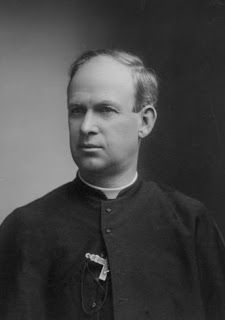
There are memorable lines aplenty in the beloved film The Princess Bride (1987), thanks to the screenwriter William Goldman, on whose 1973 novel it was based. Among them is the following, addressed to the villainous Vizzini (Wallace Shawn) by the fencer Inigo Montoya (Mandy Patinkin): “You keep using that word. I do not think it means what you think it means.” The word in question is “inconceivable,” which Vizzini uses so freely that his henchman is eventually forced to protest, and I was reminded of it when browsing through John Augustine Zahm’s The Catholic Church and Modern Science: A Lecture (1886). Zahm (right; 1851–1921) was a priest as well as a professor of physics and chemistry at the University of Notre Dame.
Early in the lecture, Zahm assures his listeners that “evolution is, at its best, only a theory—only a hypothesis. It is simply an assumption, and an assumption too that rests on other assumptions.” Among them is the assumption that “organic was derived from inorganic matter, by the simple interaction of the forces of nature.” Evolution, he asserts, “assumes the truth of the theory of spontaneous generation, and that, too, in the face of unanswerable, I might say, conclusive, scientific evidence against it.” Here he cites Pasteur and Tyndall and Carpenter—it’s the zoologist William B. Carpenter (1813–1885) that Zahm has in mind—and Virchow, but also Darwin: “Even Darwin himself considered spontaneous generation as ‘a result absolutely inconceivable.’” Inconceivable!
Why might Zahm have thought so? The words about the origin of life in the final passage of On the Origin of Species—“probably all the organic beings which have ever lived on this earth have descended from some one primordial form, into which life was first breathed”—might be thought to support the inference that Darwin rejected abiogenesis. And it might be furthermore suggested that perhaps Zahm was unaware of Darwin’s regrets, publicly expressed in 1863, about using the “Pentateuchal terms” (in the catty phrase used in Richard Owen’s anonymous review of the Origin for the Athenaeum) when he wanted only to indicate that “our ignorance is as profound on the origin of life as on the origin of force or matter.”
But Zahm must have been aware of Darwin’s regrets, because it is in the very same letter that Darwin wrote “a result absolutely inconceivable.” And here it is in context: “Now is there a fact, or a shadow of a fact, supporting the belief that these elements, without the presence of any organic compounds, and acted on only by known forces, could produce a living creature? At present it is to us a result absolutely inconceivable.” So Zahm omitted the crucial qualification “at present,” making his use of the Darwin quotation a particularly crude distortion. That’s especially so because editions of the Origin from 1863 onward contained the similar passage “science as yet throws no light on the far higher problem of the essence or origin of life”—note the “as yet”!
Omitting the qualification “at present” from Darwin’s regrets is not unique to The Catholic Church and Modern Science, it proves. George William Herbert’s Notes of Catechisings (1884), under the head “Living Matter out of dead matter,” continues, “Is a result absolutely inconceivable,” crediting the sentiment to “Mr. Darwin.” Similarly, Miles Grant’s Positive Theology (third edition, 1895), claims, “Mr. Darwin says it [spontaneous generation] is ‘absolutely inconceivable.’” I don’t see any particular reason to surmise that there was any influence here—after all, Zahm was a Catholic priest in Indiana, while Herbert was a Church of England vicar in London and Grant was a traveling Adventist preacher wandering throughout North America.
Distorted quotations are so persistent in the antievolutionary literature that it is something of a relief to be able to report that Zahm, if never acknowledging his distortion, at least didn’t repeat it in Evolution and Dogma (1896), the book on which his fame largely rests. In a section on abiogenesis, he writes, “Even those whose theories imply, if they do not demand, the spontaneous origination of living from non-living matter, are forced to admit that there is, as yet, no warranty whatever for believing that abiogenesis obtains now, or ever has obtained, at any time in the past history of our globe”—note the “as yet”! Darwin is quoted, but only as saying, “I should like … to see archebiosis proved true, for it would be a discovery of transcendent importance.”
“Archebiosis,” you ask? It was Henry Charlton Bastian’s term, in his The Beginnings of Life (1872), for abiogenesis. (Not to be confused with Haeckel’s “archigony” or indeed with Marquis’s “archyandmehitabel.”) You might also be wondering if Zahm played fast and loose with the later quotation from Darwin. Not really, or at any rate not tendentiously. It’s taken from Darwin’s August 28, 1872, letter to Wallace, in which he relates his mixed impressions of Bastian’s book. The sentence Zahm quotes is close to accurate (he omitted “to live” after “like,” and lowercased Darwin’s “Archebiosis”) but incomplete: it continued, after a semicolon, “or, if false, I should like to see it disproved, and the facts otherwise explained; but I shall not live to see all this.”
While The Catholic Church and Modern Science is generally skeptical about evolution—which it describes as “so far, … at best, a conjecture, a theory, not only unproven, but a theory that, as it is now taught, would seem to be unprovable”—I should acknowledge that Evolution and Dogma is generally friendly to, if not uncritical of, evolution. “[W]hen viewed in the light of Christian philosophy and theology,” Zahm orates, “there is much in Evolution to admire, much that is ennobling and inspiring, … much that throws new light on the mysteries of creation, much that unifies and coordinates what were otherwise disconnected and disparate, … much, in fine, that makes the whole circle of the sciences tend, as never before, ad majorem Dei gloriam.”

